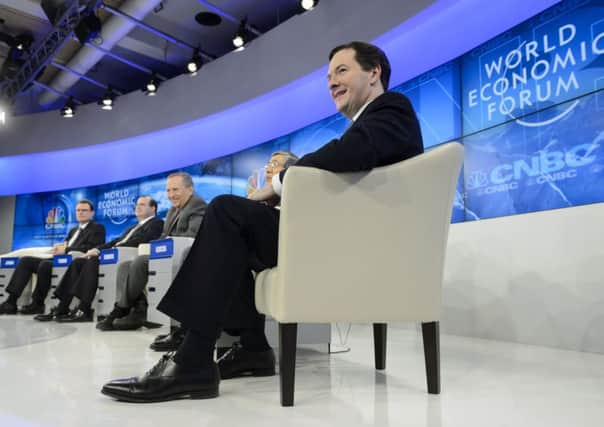Britain enjoys best economic growth since 2007


George Osborne hailed official figures revealing that Gross Domestic Product (GDP) increased by 1.9 per cent in 2013, the healthiest rate of growth since 2007.
The increasing growth, the Chancellor claimed, was proof that the UK government’s long-term economic plan to cut the deficit was working.
Advertisement
Hide AdAdvertisement
Hide AdThe figures, from the Office for National Statistics (ONS), showed that the pace of recovery fell slightly in the fourth quarter of last year to 0.7 per cent. Economists, however, are predicting annual improvement of up to 3 per cent for 2014.


The Chancellor’s suggestion that the figures were further vindication of his austerity measures were disputed by Labour, who argued that the recovery has yet to break through to ordinary pay packets.
Despite the improving figures, GDP still remains 1.3 per cent below its pre-recession peak in the first quarter of 2008.
Mr Osborne said: “These numbers are a boost for the economic security of hard-working people. It is more evidence that our long-term economic plan is working.
“But the job is not done, and it is clear that the biggest risk now to the recovery would be abandoning the plan that’s delivering jobs and a brighter economic future.”
Prime Minister David Cameron tweeted: “The GDP figures are another sign our long-term economic plan is working – more growth means more jobs, security and opportunities for people.”
But Labour and the unions said these improved figures had yet to make an impact on the cost of living. They pointed out that wage growth was lagging behind inflation and argued that a recovery led by house prices and consumer debt could prove unsustainable.
Shadow chancellor Ed Balls said: “For working people facing a cost-of-living crisis this is still no recovery at all.
Advertisement
Hide AdAdvertisement
Hide Ad“And with business investment still weak, construction output down and housing demand outstripping housing supply, this is not yet a recovery that is built to last.”
Trades Union Congress (TUC) general secretary Frances O’Grady said: “Any return to growth is welcome, but this is the wrong kind of recovery and is two years late.
“The recovery is yet to reach whole swathes of the country or feed into people’s pay packets. This must change if the benefits of recovery are to be felt by both businesses and workers.”
In the final quarter of 2013, output increased in three of the four main industrial groupings within the economy. Output increased by 0.5 per cent in agriculture when compared with the same period in 2012. Production increased by 0.7 per cent and the biggest increase was seen in the service sector where there was a rise of 0.8 per cent.
That trend was not mirrored in construction, however, which experienced a 3 per cent drop.
Yesterday’s figures did not include a breakdown of GDP figures for the constituent countries of the UK.
Therefore there was not an accompanying up-to-date growth figure for economic growth north of the Border.
In Scotland, politicians’ reactions to the GDP figures depended on which side of the constitutional fence they stood on.
Advertisement
Hide AdAdvertisement
Hide AdThe Scottish Secretary Alistair Carmichael claimed the improving economic performance illustrated the benefits of staying within the United Kingdom.
SNP finance secretary John Swinney welcomed the improvement, but said it had materialised “despite” the UK government’s economic policies.
Mr Swinney said the most recent figures for economic growth in Scotland indicated it was outperforming the rest of the UK – a disparity, he claimed was down to his SNP administration’s policies.
Mr Carmichael said: “The fact the GDP figures show the strongest rate of annual economic growth since 2007 is good news for Scotland. The economy has grown by 0.7 per cent for the quarter and by 1.9 per cent over 2013. This comes on the back of a sustained period of good news for the Scottish and UK economy. Our plan for the economy is working and there is still a great deal of work to do.
“The UK GDP figures come in the wider positive context which show the inflation rate dropping to 2 per cent from a peak of 5.2 per cent in September 2011, a recovering labour market and both the World Bank and the IMF indicating they expect higher global economic growth in 2014.”
Mr Swinney said the UK economy was still well below pre-recession levels and the performance was worse than any G7 country except Italy.
“It is clear that recovery is happening in spite of the actions of the UK government, rather than because of them,” Mr Swinney said. “As a result growth forecasts are now 5.9 per cent lower than originally predicted and borrowing is £197 billion higher.
“Scotland has taken a different route where possible and the official figures show that after 18 months of consistent growth our economy is 0.9 per cent below its pre-recession peak in output, compared to the UK as a whole which is still 1.3 per cent below even after today’s figures.
Advertisement
Hide AdAdvertisement
Hide Ad